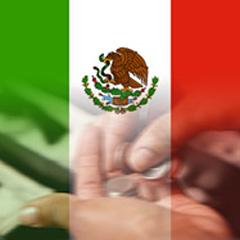 |
 |
 |
 Business News | November 2006 Business News | November 2006  
Better Business Across the Border
 Ronald D. White - LATimes Ronald D. White - LATimes


| | Californians join trade mission to Mexico. |
Javier Martinez, of the Mexican Business Council of Los Angeles, is seeking ways to cut the cost of bringing in products from Mexico.

Hilario Navarro considers himself an old-fashioned “slaughter to steak” butcher, just like his father and grandfather.

But the 43-year-old Glendale, Calif., resident is sharpening his knives for a family first: Navarro wants to acquire Mexican food products to sell in the U.S. and establish a market for his meats and other goods south of the border.

Navarro, who owns Bonanza Foods & Provisions Inc. in the L.A. community of Vernon, is among numerous Hispanic business owners who hope to jump-start cross-border commerce. He was part of a small delegation that recently traveled to a Mexican symposium attended by companies from the states of Jalisco, Colima and Nayarit.

Trade between California and Mexico accounted for $16.2 billion in exports and $24.2 billion in imports through the state’s three customs districts in 2005, according to the Los Angeles County Economic Development Corp. That represented 12 percent of total exports and 8 percent of total imports through those districts. The figures understate California’s commerce with Mexico because a significant fraction of this flow of goods travels through Texas border crossings and therefore isn’t counted as foreign trade with California.

“Whenever you cross borders, you up the cost and complexity of doing business,” said Richard Sinkin, managing director of InterAmerican Holdings Co., a San Diego firm that invests in Mexican companies.

Navarro and the other California entrepreneurs have hope.

“These deals could materialize in the next three to six months and some maybe sooner than that,” said Navarro, who is preparing a list of products and price quotes and asking for the same from his Mexican counterparts. “I will probably have to go back again in the next two or three weeks.”

The business owners have more on their side than language and cultural ties. Each is a seasoned entrepreneur, and most of them are in their mid-40s. They run food and beverage, construction, information technology, manufacturing and grocery operations. Most have 15 to 25 employees and generate $5 million to $50 million in annual sales.

They also have forged their own path. Rather than work through traditional Hispanic business organizations, they are members of their own group – Consejo Empresarial Mexicano de Los Angeles or Mexican Business Council of Los Angeles. The 50-member association is headed by Javier Martinez, the Oxford University-educated owner of Pasadena, Calif., tequila distributor Martinez Brands.

Each did a lot of thinking about what he wanted to accomplish. Those who already do business in Mexico, such as Martinez, wanted to improve the experience.

Others, such as Navarro, made connections based on a nuanced appreciation for what he believed his customers wanted. One example is the American cured ham he sells, which is too sweet for Hispanic palates.

He found potential partners who used different spices and a different curing method “to better fit the flavor profile. It’s important since so many people in Mexican-American families are working and there is less time for cooking from scratch and more of a reliance now on things like hams and other cold cuts.”

Navarro expects to surpass $28 million in sales this year to customers that include supermarket chains such as Albertsons and several independent grocery stores. He has witnessed several changes in consumer purchasing patterns in Mexico since his father’s and grandfather’s days in Jalisco.

“Before, the eye was very important. They wanted to see it fresh and unpackaged or, at most, just paper-wrapped. Now prepackaged meats are more acceptable in Mexico, and that is a market in which we can compete,” Navarro said. He is also counting on a growing Mexican preference for American beef, which is more tender and flavorful.

The businesses already have made important friends, including Enrique Michel Velasco, president and chief executive of Guadalajara’s Dulces de la Rosa, one of Mexico’s biggest candy manufacturers. Velasco is also president of the group that hosted the forum, Consejo Mexicano de Comercio Exterior de Occidente.

“The U.S. is our primary market, but we can do more,” Velasco said.

Tequila importer Martinez joined the trade mission looking for ways to reduce the cost of bringing in products from Mexico.

He received an expensive transportation lesson in 2004, when he ordered a shipment of 1,000 cases from the Mexican port of Manzanillo. He had been told the water route would cost substantially less than trucking the goods through Laredo, Texas, his usual route.

But a labor shortage that year brought the ports of Long Beach and Los Angeles to a near-standstill. By the time the tequila finally arrived, the cost had doubled.

Martinez hasn’t tried the ports again. He raised the issue in Mexico and heard a chorus clamoring for the development of a direct shipping route between Manzanillo and Los Angeles-area ports.

The Mexican and U.S. business owners resolved to study the ports issue and make sure that the three-day meeting was more than a one-time event. They agreed to meet every three months, with the next gathering planned for California, Martinez said.

In the meantime, Navarro has his work cut out for him. He’s ironing out the details of several potential deals in Mexico, including supplying beef to a string of hamburger stands looking to expand; importing organic spreads made with guava, mango and other fruit; and selling boneless chicken and pork products.

“It was an excellent trip,” Navarro said. “There are many opportunities.” | 
 | |
 |



